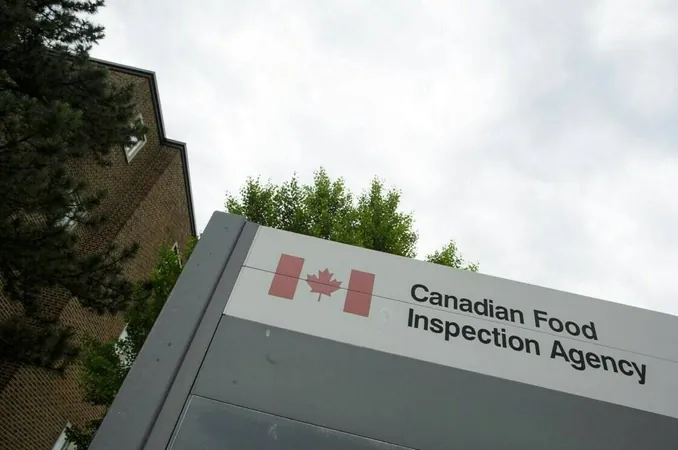
Canadian Ostrich Farmers Fight Back Against Government Culling Amid Avian Flu Panic
2025-01-15
Author: Sophie
Ostrich Farmers Challenge Government Order
In a dramatic showdown, ostrich farmers from British Columbia are challenging a government order to cull their entire herd of 400 birds due to a recent outbreak of avian flu. With a kill date looming just weeks away, the owners of Universal Ostrich Farms Inc. are desperately pleading with the Canadian Food Inspection Agency (CFIA) for reconsideration.
Government Mandate and Farmers' Arguments
The CFIA issued a dire notice on December 31, mandating the destruction of the ostriches by February 1. However, the farmers argue that these majestic flightless birds play a crucial role in important scientific research, specifically in studying COVID-19 antibodies and the dynamics of avian flu affecting young ostriches. So far, about 10% of their flock has succumbed to the virus, which the owners believe began spreading after nearby wild ducks landed on their property in Edgewood, situated about 200 kilometers east of Kelowna.
Concerns About Culling Healthy Birds
Katie Pasitney, daughter of farm co-owner Karen Espersen, emphasized that many of the ostriches—some more than 30 years old—are healthy, warning that culling would unnecessarily sacrifice over 300 strapping birds. "We would be culling 300 plus absolutely healthy animals," she said, stressing the disproportionality of the CFIA's action. The agency tested only two ostriches at the outbreak's onset, leading the farmers to demand additional testing and possibly involve third-party experts to further assess their flock's health.
Scientific Research and Collaboration
The situation is particularly critical as the farm has shifted focus from producing meat to spearheading scientific research on ostrich antibodies, collaborating with distinguished scientists like Dr. Yasuhiro Tsukamoto from Japan. This research shows promise, with Dr. Tsukamoto developing neutralizing antibodies against various infectious diseases, including H5N1 avian flu. "Currently, I have a stockpile of ostrich-derived neutralizing antibodies... primarily intended for use in masks," he stated.
CFIA's Stance and Regulations
Despite the potential of these birds for scientific research, the CFIA, citing guidelines from the World Organisation for Animal Health, maintains that culling is mandatory for any poultry premises infected with highly pathogenic avian influenza. The agency has already denied the farm's request for an exemption, claiming that such decisions are made based on sound scientific reasoning and are irreversible once issued.
Farmers Seek More Time and Other Perspectives
Yet, the ostrich farmers believe they deserve more time to demonstrate the significance of their birds. Operating under strict quarantine protocols, the farm is isolated, situated miles away from any commercial poultry operations. With the nearest city over an hour away, interactions with the birds are limited to farm co-owners practicing rigorous hygiene measures to ensure the flock's health.
Support from Experts
A key supporter of the farmers, Dr. Lyle Oberg, who has been involved with the farm's research initiatives for the past decade, urged the CFIA to reconsider its stance, highlighting the unusual survival rate of the herd. Dr. Scott Weese, an infectious disease veterinarian professor, echoed the sentiment that while culling serves as a method to halt disease transmission, it should be weighed against viable alternatives, especially when avian flu is prevalent across Canada.
Current State of Avian Flu in Canada
According to CFIA data, there have been 3,459 confirmed wildlife cases and around 66 infected domestic bird premises in Canada, making the situation even graver. Weese reiterated that culling this particular flock may not significantly reduce the broader risk, as avian flu is rampant throughout the country.
Conclusion and Future Developments
As this tense situation unfolds, the farmers remain hopeful for a resolution that acknowledges the unique attributes and contributions of their ostrich herd. Will the CFIA reconsider and allow these farmers to demonstrate the value of their flock, or will the culling proceed, marking a grim chapter in Canada's agricultural history? Stay tuned for updates on this evolving story.









 Brasil (PT)
Brasil (PT)
 Canada (EN)
Canada (EN)
 Chile (ES)
Chile (ES)
 Česko (CS)
Česko (CS)
 대한민국 (KO)
대한민국 (KO)
 España (ES)
España (ES)
 France (FR)
France (FR)
 Hong Kong (EN)
Hong Kong (EN)
 Italia (IT)
Italia (IT)
 日本 (JA)
日本 (JA)
 Magyarország (HU)
Magyarország (HU)
 Norge (NO)
Norge (NO)
 Polska (PL)
Polska (PL)
 Schweiz (DE)
Schweiz (DE)
 Singapore (EN)
Singapore (EN)
 Sverige (SV)
Sverige (SV)
 Suomi (FI)
Suomi (FI)
 Türkiye (TR)
Türkiye (TR)
 الإمارات العربية المتحدة (AR)
الإمارات العربية المتحدة (AR)